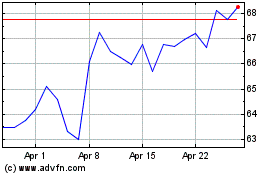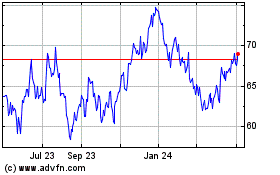Rio Tinto Shakes Up Management
March 18 2016 - 3:02AM
Dow Jones News
(FROM THE WALL STREET JOURNAL 3/18/16)
By Rhiannon Hoyle
SYDNEY -- Rio Tinto PLC said Chief Executive Sam Walsh would
retire in July, a surprise that comes as the mining giant and its
peers look for a way out of a prolonged commodity slump.
Rio said Mr. Walsh, 66 years old, would be succeeded on July 2
by the miner's copper boss, Jean-Sebastien Jacques, who was named
deputy CEO for the interim. The company's shares rose 5.4% in
London on Thursday.
Although Rio slumped to an $866 million loss last year, Mr.
Walsh has been widely credited with turning around its fortunes in
his three years on the job, mainly by cutting costs and investment
after several years of heavy spending on failed acquisitions.
While many of its peers continue to slim down, Rio has shown
early signs of switching gears even as metals prices hover near
multiyear lows. The Anglo-Australian miner has approved a bauxite
project in Australia and lined up financing to expand a Mongolian
copper mine -- a process spearheaded by the 44-year old Mr.
Jacques.
Under Mr. Jacques, Rio could put more emphasis on mergers and
acquisitions and less on its dominant iron-ore business, Paul Gait,
mining analyst at Sanford C. Bernstein, said in a note.
"It is our belief that this signals a change of direction for
Rio Tinto," he said.
Mr. Jacques and Chief Financial Officer Chris Lynch had long
been viewed by analysts and investors as potential successors to
Mr. Walsh. Mr. Jacques "has a very good CV and track record" and is
a "better growth prospect" for Rio than his predecessor, said
George Boubouras, chief investment officer at Contango Asset
Management.
Under Mr. Walsh, a 25-year Rio veteran and its former iron-ore
chief, the company flooded the global market with iron ore as
prices plunged -- a calculated but risky bet that its economies of
scale in Australia's remote, iron-rich Pilbara region would allow
it to make a healthy profit while squeezing out higher-cost
operators.
Whether the bet has paid off is arguable. Iron ore continues to
account for 80% of Rio's underlying earnings, even though prices
are down around 70% from their peak in 2011. But Citi recently
forecast that the company could make less from iron ore this year
than it did in 2006.
Last month, Moody's Investors Service lowered the miner's credit
rating, saying the outlook for its markets, particularly iron ore,
was deteriorating.
Mining chiefs have been caught off guard by the steep decline in
prices for the commodities they dig out of the ground and sell. Mr.
Walsh a year ago said the idea that a drop in iron-ore prices to
$30 a ton was "fantasy land," but the price of the steelmaking
ingredient earlier this year dipped below $40 a ton and analysts
said it could drop to $20 a ton.
Such unforeseen declines have forced executives to backtrack on
previous commitments, at times angering investors. Mr. Walsh, who
last year told investors he didn't plan to cut the company's
dividend, did just that last month.
When Mr. Walsh, an opera lover and former auto-industry
executive, assumed the top job in January 2013, Rio had just
lurched to its first-ever annual loss. Several multibillion-dollar
bets on commodities from aluminum to coal had turned sour,
effectively costing predecessor Tom Albanese his job.
Mr. Jacques, who will join the board right away, could either
bolster Rio's current vast copper mining operations, which includes
a 30% stake in Escondida in Chile, the world's most productive
copper mine, or look to buy mines from struggling competitors,
mining-industry experts said.
---
Scott Patterson contributed to this article.
(END) Dow Jones Newswires
March 18, 2016 02:47 ET (06:47 GMT)
Copyright (c) 2016 Dow Jones & Company, Inc.
Rio Tinto (NYSE:RIO)
Historical Stock Chart
From Jun 2024 to Jul 2024

Rio Tinto (NYSE:RIO)
Historical Stock Chart
From Jul 2023 to Jul 2024
